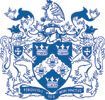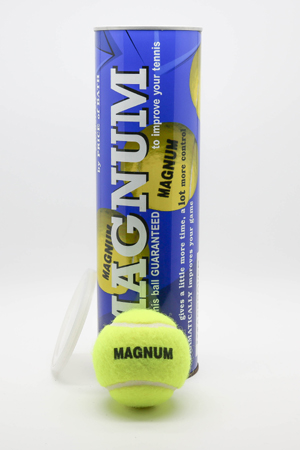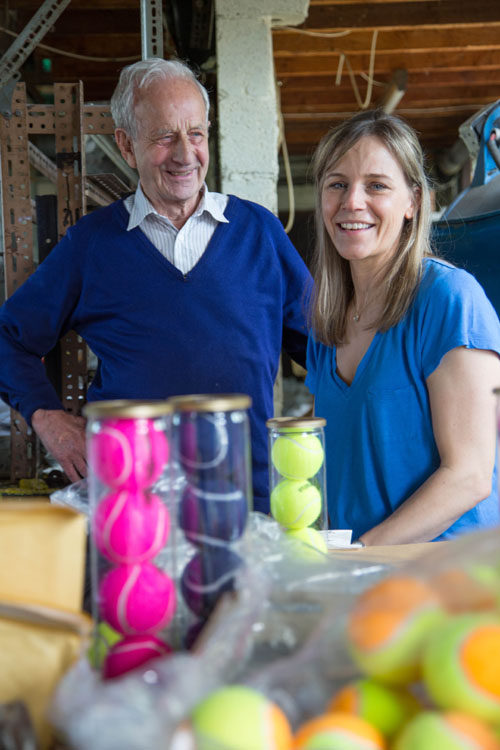Price thinking big in battle of the ball boys
Independent
by John Roberts
Tuesday 21 March 2000


Having made a successful first serve with his "Magnum", a new, larger ball which has been tested and approved by the International Tennis Federation in the hope that it will enhance the game with longer rallies, Derek Price is expecting reprisals from rivals with more clout.
"The bigger guys are tooling up like mad," Price says. "When the big boys get in they will bury me. I have one season, possibly two."
B-movie dialogue sits uncomfortably with the sport of Pimms, particularly when spoken in a West Country accent by a 69-year-old who would not seem out of place astride the cow in the Ambrosia advertisement. It was a relief to discover that the "big boys" are not Dillinger and Scarface but the likes of Dunlop and Slazenger, and that Price is defiant rather than fearful in the face of retaliation. His rubber company, J Price Bath Ltd, is accustomed to challenges. The advent of cheap tennis balls from the Far East practically put the firm out of business. It only survived because of other products which were selling, such as anti-vibration mountings for ships, submarines and cars, and acoustic tiling.

A glance at the antediluvian factory in Bath where the "Magnum" is manufactured would call up the phrase pioneering spirit, except that it appears to have been designed by Heath Robinson in mischievous mode. "The site was a candle and soap factory in 1842, when workmen were digging the box tunnel on the Bristol to London railway line," Price recounted. "My father, Joseph, was a rubber man from Leicester, via Firestone. When we came here in the late 1930s I can remember seeing candle fat and soap. Parts of the the factory were Dickensian."
Victorian country houses and vicarages adopted lawn tennis after the advent of the rubber ball allowed the ancient indoor game of real tennis to be adapted outdoors (thanks to the discovery by Charles Goodyear, in 1839, of the way to vulcanise raw rubber by heating it with sulphur to make it resilient).
Price, by increasing the size of the ball (70mm as opposed to 66mm, with no difference in weight) hopes to capitalise on the ITF's rule change regarding specifications. The "Magnum" retails at £7 (including VAT) for a tin of four.
"I've been told for 20 years that the game's too fast, ever since wooden rackets went out," Price said. "Getting on for four seasons ago I decided to make a bigger ball. Two seasons ago I took some samples to a trade fair in Munich. A lot of interest was shown, and some ITF people came to the stand.
"Eighteen months ago I went into production. I sent balls out to God knows how many tennis clubs. The youngsters and older players liked them, and there were mixed feelings in the middle-aged range. The balls have been approved by the ITF for two years for professional games and for recreational club games on certain faster surfaces (grass, wood, certain artificial grass surfaces, certain plastic surfaces) but not on shale, or clay, or tarmac."
Janet Page, of the ITF's technical department, said: "This is not a case of the ITF endorsing a ball. It was submitted for ITF approval and conforms to the rules of tennis regarding the specification of the larger ball for a two-year experimental period. We are not talking about Wimbledon. It is aimed at the recreational player."
Price has seen interest in tennis rise and fall dramatically during the company's 63 years. "In the tennis boom all over the developed world, from 1963 to about 1980, our biggest market was Canada and the United States," he said. "We sold 7,000 dozen balls a week. We also did private branding - Rod Laver, Ken Rosewall, Virginia Wade, all sorts of names - for the bigger companies. Not enough tennis balls were being made in the world.
"When tennis was booming we bought a new site, but never got to use it. Production in the Far East knocked us for six - 80 per cent of our business was tennis balls until 1980, then 60 per cent of our turnover disappeared. We are niche producers. We make very light tennis training balls for coaching children, and we also make standard balls, pressurised and unpressurised. Fifteen years ago we started making squash balls again, something we stopped doing after World War II, and we are the only producers of balls for Eton Fives.
"When there's a boom, there's always a bust. Tennis is diminishing in the developed world, but in underdeveloped nations it's growing. If I live long enough, I shall be the only manufacturer left in the UK."
Price describes advance sales of the "Magnum" as tentative. "We've sold about 1,000 dozen so far. I've spent about £40,000 on advertising and publicity. By the end of June the brand will be known. The name 'Magnum' was suggested by one of my factory guys. If it takes off I'll give him another Christmas bonus."
The company sent sets of balls to more than 2,000 individual clubs as part of a customer survey and plans to invest in a junior tennis tournament based on the "Magnum" later this year. "It's my pension I'm spending," Price said, "because I'm always at work. I'm a bit of a terrier. I'm at the factory seven days a week, except when I'm skiing. I try to go skiing one week a month."
As summer approaches, perhaps Price will put away the skis, take up his racket and make the most of the greater time the "Magnum" is reputed to allow for shot-making. Or perhaps not. "I'm not a tennis nut, I'm a rubber technologist. As a tennis player, I'm a rabbit," he said. "I do go on the court, but as and when. I've seen too many tennis balls."
